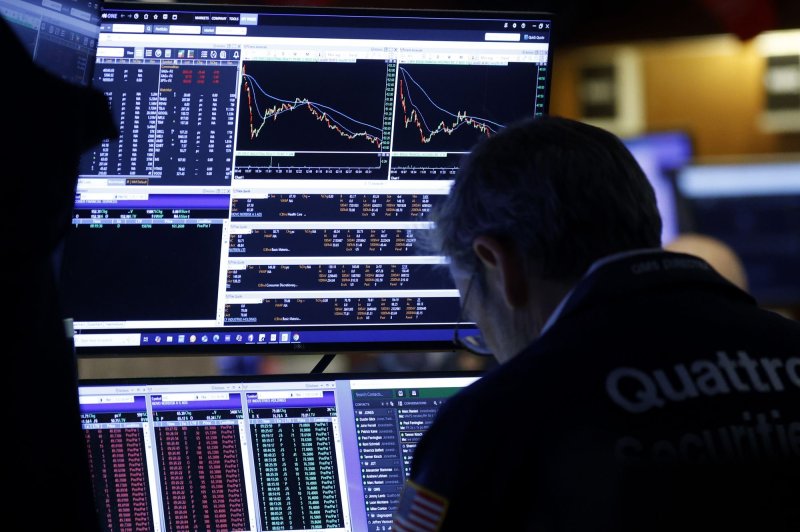1 of 7 | Traders work on the floor of the New York Stock Exchange on Wall Street on Friday in New York City. The Dow Jones Industrial Average opened down more than 1,000 points as U.S. stocks continued to be volatile due to trade-war worries from President Donald Trump’s tariffs. Photo by John Angelillo/UPI |
License PhotoApril 4 (UPI) — Federal Reserve Chairman Jerome Powell warned Friday that Trump’s strict tariffs will worsen inflation and lower economic growth. As a result, the Fed won’t change interest rates until the full economic effect is clarified.
In prepared remarks, Powell said, “It is now becoming clear that the tariff increases will be significantly larger than expected. The same is likely to be true of the economic effects, which will include higher inflation and slower growth.”
He added, “Our obligation is to keep longer-term inflation expectations well anchored and to make certain that a one-time increase in the price level does not become an ongoing inflation problem.”
Powell’s Arlington, Va., remarks came at the Society for Advancing Business Editing and Writing Annual Conference.
Powell said that while uncertainty is high and “downside risks have risen,” the economy is still in a good place.
As the Fed chair was warned of the negative effect of high tariffs, markets worldwide continued a free fall, with the Dow losing 1,738 points early Friday afternoon. That’s on top of a 1,679 point drop Thursday.
The huge tariffs, imposed in what President Donald Trump celebrated in the White House Rose Garden on Wednesday as “liberation day,” immediately created huge market damage not only for the Dow but also the S&P 500.
Powell stressed that “it will be very difficult to assess the likely economic effects of higher tariffs until there is greater certainty about the details, such as what will be tariffed, at what level and for what duration, and the extent of retaliation from our trading partners.”
Japan’s Nikkei 225 index plunged nearly 1,000 points Friday as China retaliated against the Trump tariffs and the International Monetary Fund warned of “significant” risks.
Japanese Prime Minister Shigeru Ishiba told lawmakers Japan was facing a national crisis due to the huge tariffs.
The self-inflicted economic damage in the United States is hurtling international trade into chaos, weakening U.S. allies economically as security threats from Russia, China and Iran grow more dire.
Powell’s Friday remarks about the negative economic hit from the tariffs came after Trump told Powell to “stop laying politics” and cut interest rates because inflation is down.
But Powell said core PCE inflation is actually up to 2.8% and “progress toward our 2% inflation objective has slowed.”
Meanwhile, the European Union said it does not impose 39% tariffs on the United States as Trump claims.
According to the European Commission “considering the actual trade in goods between the EU and US, in practice the average tariff rate on both sides is approximately 1%.”
The Commission said in 2023 the United States collected $7.65 billion in tariffs on European exports while the EU collected $3.28 billion on U.S. exports.
Powell said, “Looking ahead, higher tariffs will be working their way through our economy and are likely to raise inflation in coming quarters.”
